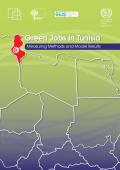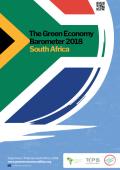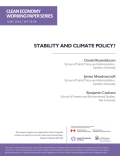
This report, Green Jobs in Tunisia: Measuring Methods and Model Results, studies the case of Tunisia and seeks to quantitatively analyse the extent of decent green jobs that currently exist in the country as well as the potential implications of such scenarios for Tunisian labour markets.

The Green Economy Barometer 2018: South Africa, produced by South African thinktanks the African Centre and Trade & Industrial Policy Strategies (TIPS) and supported by the Green Economy Coalition (GEC), provides a snapshot of the transition to a fair, green economy. It is drawn from evidence of policy progress as well as the insights of civil society organisations who are tracking the transition on the ground.

This working paper from the Smart Prosperity Institute aims to harness insights on path dependency, policy feedback, and transition pathways to help accelerate the low-carbon transition.The final version of this working paper appears in Energy Research & Social Science. It is part of the Clean Economy Working Paper Series disseminates findings of ongoing environmental and clean economy work conducted by researchers from a range of disciplines.
The paper titled Evaluating various choices of sector coverage in China’s national emissions trading system (ETS) is about sector coverage matters greatly in designing China’s national emissions trading system (ETS), with issues to be considered including impacts on emission reduction, economic and social welfare change, and carbon leakage to uncovered sectors.
This paper, A Proposal for a Simple Methodology to Enhance Transparency and Comparability of NDC Targets and Their Progress Reporting under the Paris Agreement, proposes an approach to the design of the contents of reporting processes, addressing the issues of greenhouse gas measurement, reporting and verification (GHG MRV) for NDCs.
